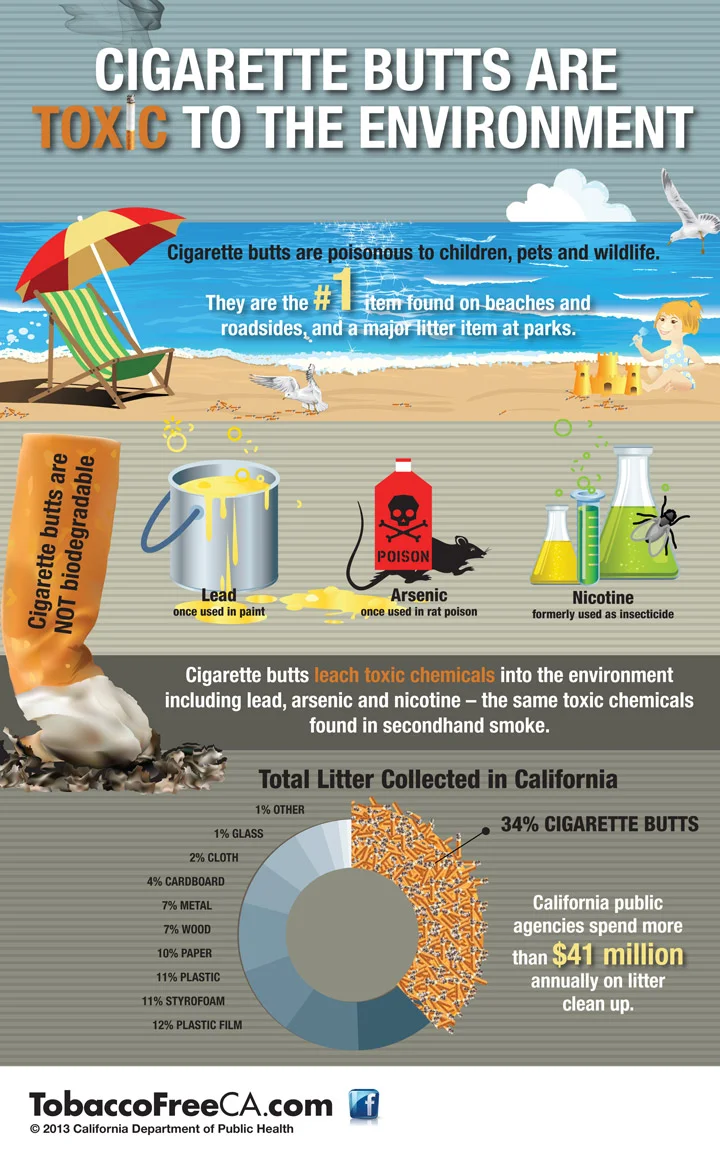Cigarette Litter
In the 1990's, there was a revolution against cigarettes because they contain deadly chemicals that have killed hundreds of millions of people. Still, cigarettes butts continue to be by far the most littered item found in our rivers, parks, beaches, and streets.
The Centers for Disease Control and Prevention reports that 292 billion cigarettes were smoked in the United States in 2011 and studies show that up to two-thirds of them were littered. The Ocean Conservancy consistently finds twice as many cigarettes than any other littered item; at their recent International Coastal Cleanup event, they found more than 2 million cigarettes in one day.
One cigarette butt can contain up to 60 known human carcinogens including arsenic, formaldehyde, chromium and lead. Toxicological data has shown that chemicals from discarded cigarette butts are capable of leaching into surrounding water where they can harm aquatic life. Nicotine has been shown to be lethal to species of fish, crustaceans, zooplankton, and other aquatic organisms, as well as being a known insecticide.
On top of leeching toxins, cigarette butts present an ingestion, choking and poisoning hazard to wildlife that mistake them for food. Cigarette filters are also composed of cellulose acetate, a form of plastic that can persist in the environment for long periods of time. Plastics of this sort have been found in the stomachs of sea turtles, fish, birds, whales and other marine creatures.
A study conducted by by a San Diego State University public health researcher, approved by the SDSU Institutional Review Board, found that one cigarette butt can kill half of the fish in 1 liter of water. With more than 150 billion cigarette butts being littered every year in the United States, the amount of this pollution is a significant environmental threat.
Furthermore, each year poison control centers in the United States receive thousands of reports of children ingesting tobacco products. One study has shown that the mean age of children involved in ingesting cigarette butts was just 12 months; 77% of the children were between the ages of 6 and 12 months.
Cigarettes are also the leading cause of fatal home fires in the United States. Every year, fires started by cigarettes are responsible for more than $6 billion in societal costs and direct property damage, about 2,500 injuries and over 1,000 deaths. More than a hundred fatal victims are innocent bystanders - children and nonsmokers.
Local governments are particularly hardhit by the costs of cleaning up cigarette litter, the most abundant type of litter. Efforts to reduce and cleanup cigarette pollution and litter are resulting in significant new costs for public agencies and taxpayers. Public agencies in California are already spending hundreds of millions of dollars annually on litter cleanup. Residents of areas with federally-deemed impaired waterways, such as the LA River, pay billions to meet Total Maximum Daily Loads for trash. Local officials have estimated complying with TMDL requirements could cost a total of $23 billion.

